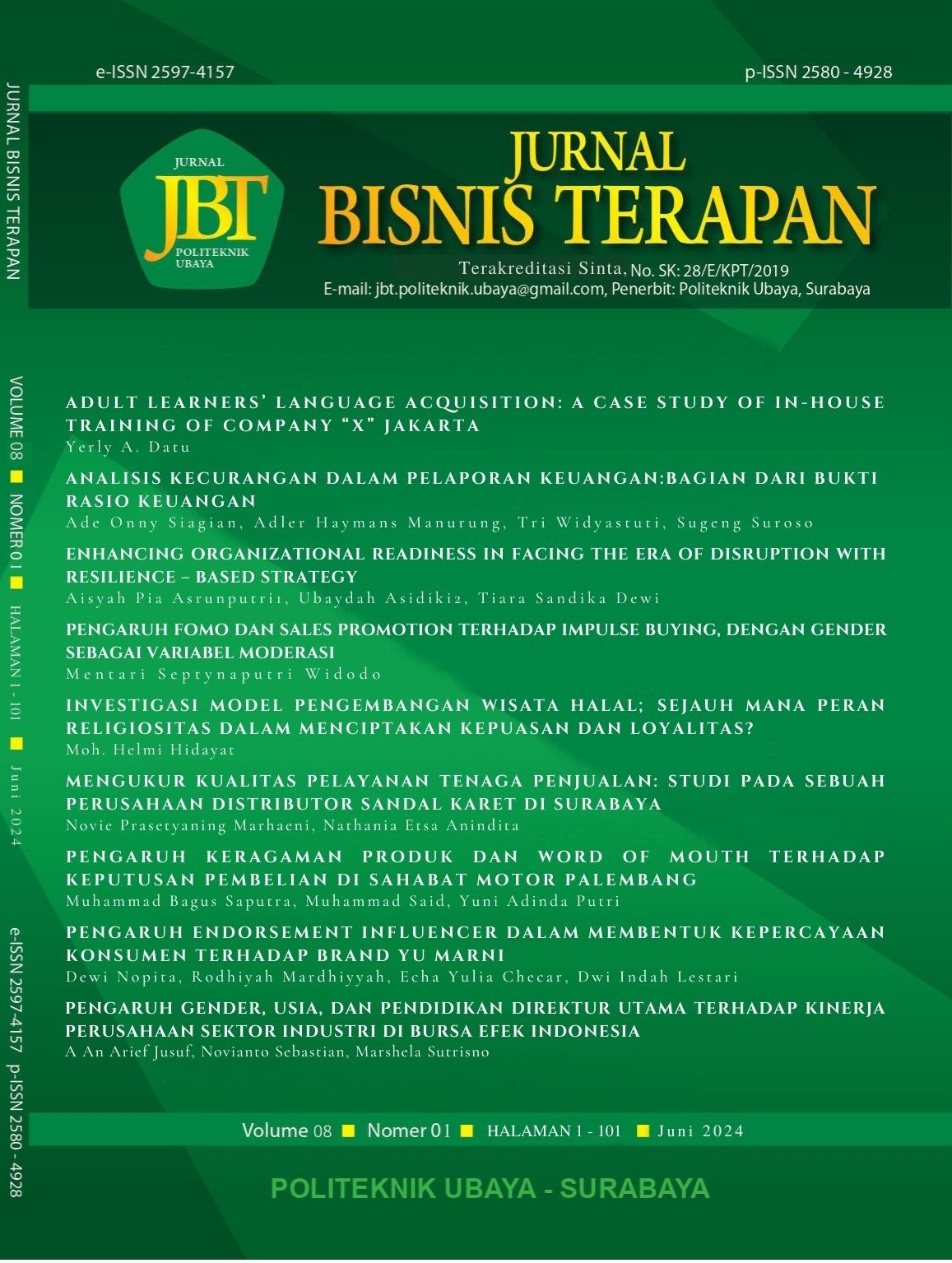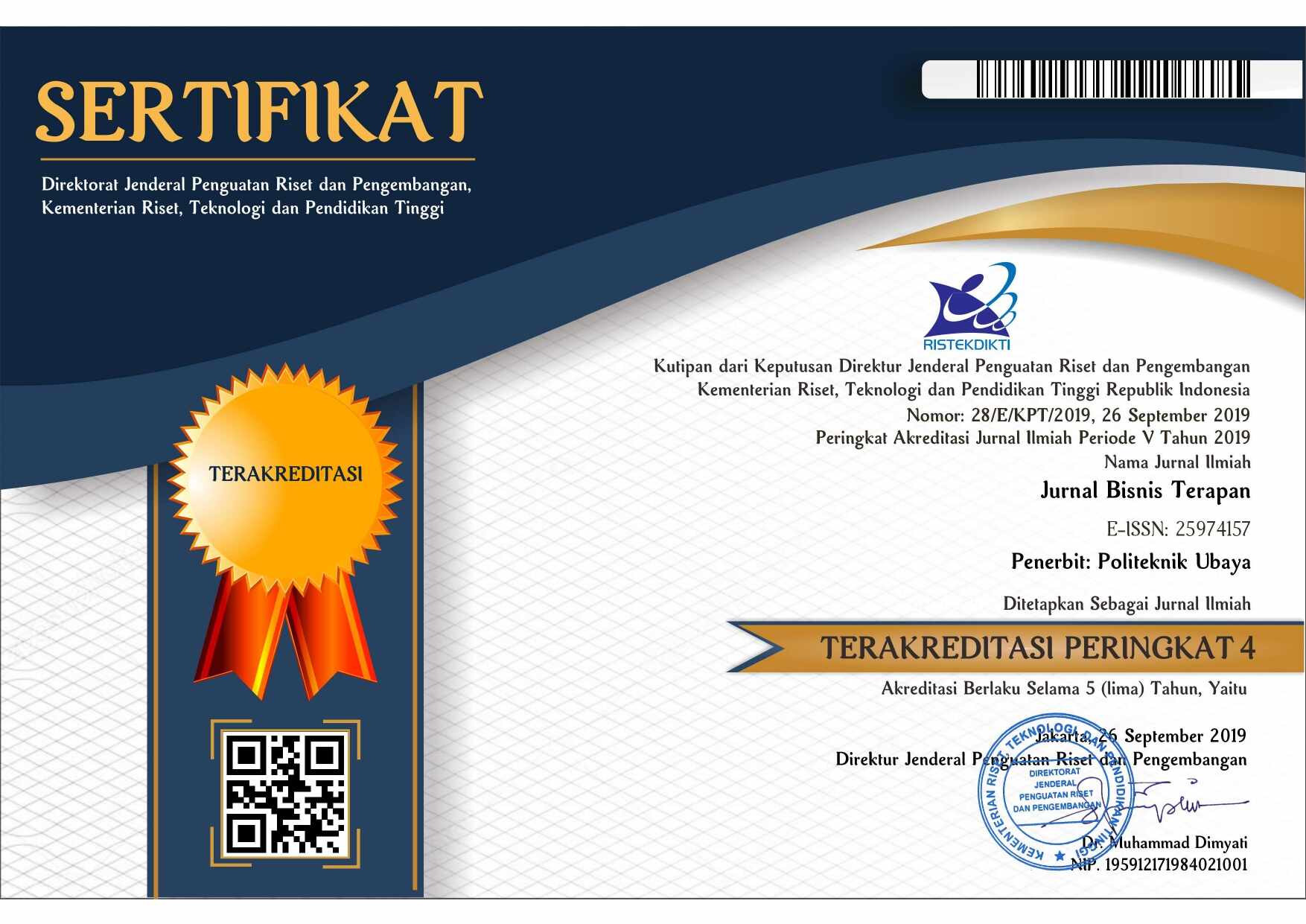PENGARUH FOMO DAN SALES PROMOTION TERHADAP IMPULSE BUYING, DENGAN GENDER SEBAGAI VARIABEL MODERASI
 Abstract Views:
4246 times
Abstract Views:
4246 times
 PDF Downloads:
3039 times
PDF Downloads:
3039 times
Abstract
The rapid development of online web-based technology has significantly improved the concept of social media. The field of e-commerce has also undergone a massive evolution leading to the emergence of a new phenomenon known as Social commerce. The high development of Social commerce ultimately makes it easier for users to obtain information and makes it easier for them to shop online. This ultimately gives rise to a phenomenon called impulse buying. This study aims to examine the influence of sales promotion and FOMO on impulse buying and how gender moderate the relationship between sales promotion and impulse buying. The researcher surveyed 110 Indonesian z generation as respondents. The results show that Impulse buying and sales promotion positively affect the impulse buying, and gender moderate the relationship between sales promotion and impulse buying. This finding is line with those studies on the same topics which have conducted before in the last five years.
Downloads
References
Abdelsalam, S., Salim, N., Alias, R. A., & Husain, O. (2020). Understanding online impulse buying behavior in social commerce: a systematic literature review. IEEE Access, 8, 89041-89058.
E. Genchev and G. Todorova, “Sales promotion activities–effective tool of marketing communication mix,” Available at SSRN 3089894, 2017
Febriandika, N. R., Utami, A. P., & Millatina, A. N. (2023). Online impulse buying on TikTok platform: Evidence from Indonesia. Innovative Marketing, 19(3), 197.
Hajli, N., & Sims, J. (2015). Social commerce: The transfer of power from sellers to buyers. Technological Forecasting and Social Change, 94, 350–358. https://doi.org/10.1016/j. techfore.2015.01.012https://koran.tempo.co/read/ekonomi-dan-bisnis/484777/5-perbedaan-social-commerce-dan-e-commerce-beserta-pengertiannya
J. Badgaiyan and A. Verma, “Does urge to buy impulsively differ from impulsive buying behaviour? Assessing the impact of situational factors,” Journal of Retailing and Consumer Services, vol. 22, pp. 145-157, 2015.
J. Hair, W. Black, B. Babin, and R. Anderson, “Multivariate data analysis. Cengage Learning,” Hampshire, United Kingdom, 2019.
Kamalia, D., Djajadinata, M., Gunawan, F. H., & Gunadi, W. (2022). The role of hedonic motivation and FOMO on the impulsivity of e-Commerce users during COVID-19 pandemics in Indonesia. In Proceedings of the International Conference on Industrial Engineering and Operations Management (pp. 4464-4475).
Kimiagari, S., & Malafe, N. S. A. (2021). The role of cognitive and affective responses in the relationship between internal and external stimuli on online impulse buying behavior. Journal of Retailing and Consumer Services, 61, 102567.
Li, L., Griffiths, M. D., Mei, S., & Niu, Z. (2021). The mediating role of impulsivity and the moderating role of gender between fear of missing out and gaming disorder among a sample of Chinese university students. Cyberpsychology, behavior, and social networking, 24(8), 550-557.
RAHMAN, A., FAUZIA, R. N., & PAMUNGKAS, S. (2020). Factors influencing use of social commerce: an empirical study from Indonesia. The Journal of Asian Finance, Economics and Business, 7(12), 711-720.
S. A. Musadik and I. A. G. Azmi, “The Impact of Sale Promotion On Impulse buying Behavior Among Muslim Credit Cardholders in Malaysia,” Int. J. Mod. Trends Soc. Sci, 2020.
Soelton, M., Ramli, Y., Wahyono, T., Saratian, E. T. P., Oktaviar, C., & Mujadid, M. (2021). The impact of impulse buying on retail markets in Indonesia. The Journal of Asian Finance, Economics and Business, 8(3), 575-584.
W.-K. Chen, C.-W. Chen, and Y.-C. Lin, “Understanding the influence of impulse buying toward consumers’ post-purchase dissonance and return intention: an empirical investigation of apparel websites,” Journal of Ambient Intelligence and Humanized Computing, pp. 1–14, 2020.
Widodo, M. S. (2023, September). Exploring Consumers’ Impulse buying Behavior on Social Commerce Platforms: The Role of Fear of Missing Out (A Study on Tiktok Livestream-Selling). In 20th International Symposium on Management (INSYMA 2023) (pp. 377-384). Atlantis Press.
Zhang, H., Lu, Y., Gupta, S., & Zhao, L. (2014). What motivates customers to participate in social commerce? the impact of technological environments and virtual customer experiences. Information and Management, 51(8), 1017–1030. https://doi. org/10.1016/j.im.2014.07.00


This work is licensed under a Creative Commons Attribution-NonCommercial-ShareAlike 4.0 International License.

Ciptaan disebarluaskan di bawah Lisensi Creative Commons Atribusi-NonKomersial-BerbagiSerupa 4.0 Internasional.
-
Articles published in Jurnal Bisnis Terapan are licensed under a Creative Commons Attribution-NonCommercial-ShareAlike 4.0 International (CC BY-NC-SA 4.0) license, which permits anyone to copy, transform, or redistribute articles for any lawful purpose in any medium, provided appropriate credit is given to the original author(s) and Jurnal Bisnis Terapan is recognized as its original publisher. A link to this license should also be provided. Any derivative work of an article published in Jurnal Bisnis Terapan must also be shared under the same (or compatible) license.
-
Both copyright and publishing rights on articles are retained by the respective author(s), without restrictions. Only a non-exclusive license is granted to Jurnal Bisnis Terapan to publish the article and identify itself as its original publisher.

 DOI:
DOI:






